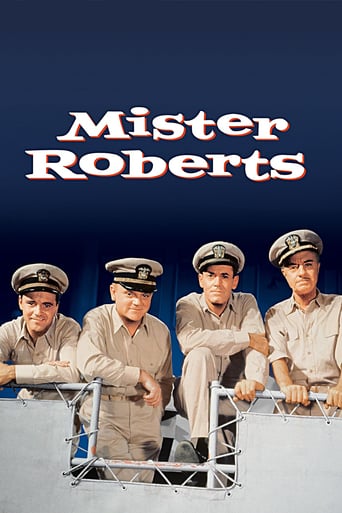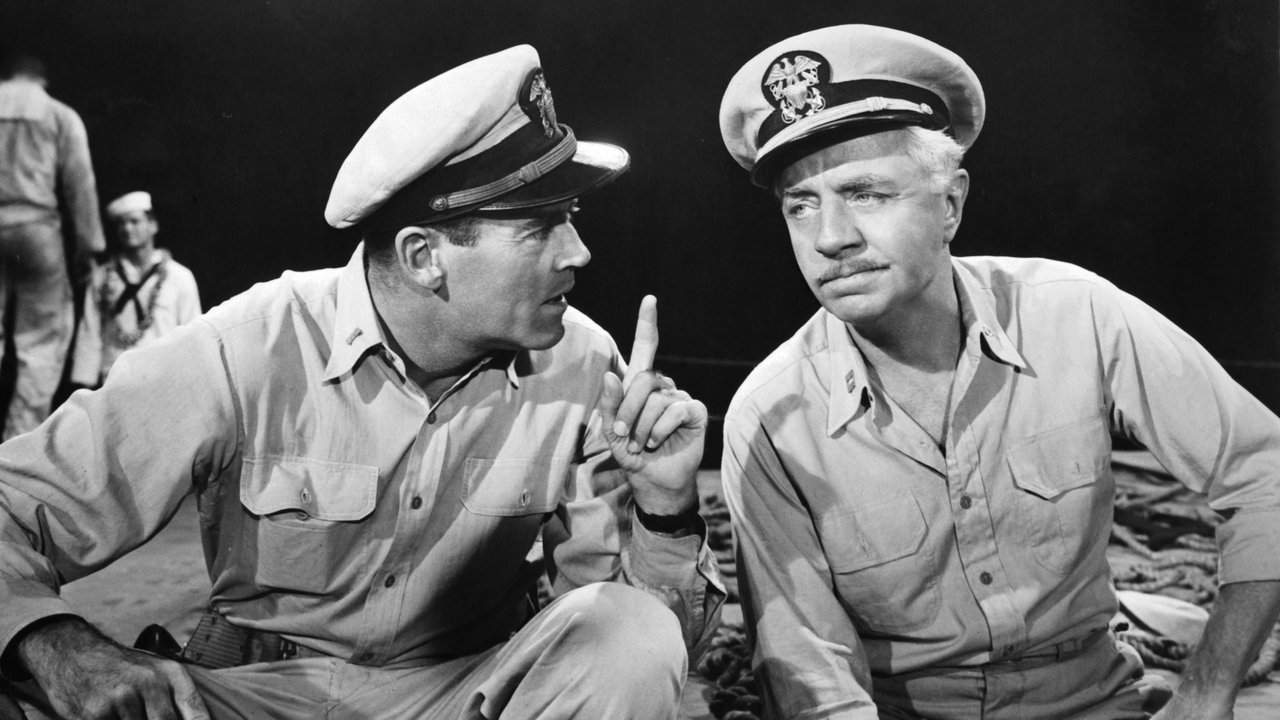verovalera1976
This movie is really a good one, with great actors that we know already. The story of a crew of navy men during the WW 2 on the Pacific Ocean that try to have fun but the captain of the ship doesn't want to hear a thing. Lt. Roberts, played by Fonda, tries to convince his superior to give them the chance to have a permission for 24 hours. Pulver, played by Lemmon, is a real troublemaker and a man who desperately wants to meet the girls on shore. Roberts tries as well to join the front because he's tired of boredom. As the movie goes through the end, a tragic event makes the crew and especially Pulver astonished by reading the letter of a friend of his. Frustated, Pulver finishes the job where Roberts started....
jacobs-greenwood
This essential comedy drama features Henry Fonda in the title role, a part that won the actor a Tony Award in 1948. Directed by Mervyn LeRoy (after John Ford left the project), it earned Jack Lemmon his first Oscar – Best Supporting Actor – for playing Ensign Pulver, who finally grows a backbone in the film's final minutes, uttering one of movies' most unforgettable closing quotes in the process. The movie was nominated for Best Picture by the Academy and William A. Mueller received a nomination for Best Sound, Recording. The screenplay was written by Frank S. Nugent and Joshua Logan from the play that Logan and Thomas Heggen had adapted from Heggen's novel.Roberts is the cargo officer on the U.S.S. Reluctant, a supply ship anchored among islands in the Pacific some 5,000 miles from where the action is taking place (i.e. Okinawa) near the end of World War II. He yearns to join the fight, but his commanding officer – Captain Morton, played by James Cagney – denies each of his transfer requests. Morton resents college educated 'boys' like Roberts, who is too valuable an officer to let go given the Captain's aspirations for a promotion. A Rear Admiral who'd awarded Morton a palm tree advised him to hang on to his sterling cargo chief, so he tolerates his officer's mild subordination; Roberts suffers while providing a much needed buffer between the tyrannical Morton and the crew, which idolizes their cargo officer. The Captain insists that the men wear their shirts while on deck (per protocol) in the oppressive heat of the South Pacific and has kept them from the recreation of liberty ports for more than a year.William Powell (in his final role) plays the ship's doctor, Roberts' only peer on the Reluctant; both marvel at fellow laundry and moral officer Pulver's braggadocio about his past – improbable exploits, primarily with women – while witnessing his cowardice by avoidance of Captain Morton. Ford regular Ward Bond plays Chief Petty Officer Dowdy and Phil Carey, Ken Curtis, Harry Carey Jr. and Patrick Wayne are among the ship's mates; Martin Milner plays a shore patrol officer who's incredulous at the wild things that the Reluctant's crew does once they finally get their liberty, which is exacted at a high price from Roberts by Morton. Later, Roberts celebrates V-E day by throwing the Captain's cherished palm overboard. Betsy Palmer plays a blond nurse that Pulver meets.
AaronCapenBanner
Mervyn Leroy & John Ford directed this hit comedy based on the successful stage play that stars Henry Fonda as Lt. Doug Roberts, who is stationed on a cargo ship in the Pacific during WWII. He desperately wants to see some action, but the tyrannical Captain(played by James Cagney) refuses to grant his transfer request. William Powell plays the Doctor, a fellow Lt. who offers Roberts friendship and sympathy. They are both amused by timid Ensign Pulver(played by Jack Lemmon, who won a best supporting actor Academy Award) who has many schemes to avoid both work, and a confrontation with the Captain, which of course is inevitable... Reasonably funny film with good performances does go on too long and isn't always credible, but is still enjoyable enough as a diversion.
dimplet
This is the sort of movie that Americans take for granted, but that in China would get you thrown in jail -- for watching it or making it. There are other countries in Asia and elsewhere where a movie like this simply could not be made even today because it glorifies individualism and standing up to authority. I mentioned in my comments on "Baby Face" how Warner Bros. was the studio that featured rebels and that broke social rules. This is a typical example, although the story would seem tame by today's standards. I'm not sure how it was received at the time, particularly by the Navy, but I doubt it generated a rash of mutinous behavior, in part because James Cagney's character was so thoroughly dislikable that few actual Navy captains could live down to such a standard. Nobody on this Navy ship respects the captain, and they only obey him grudgingly. And it is not a joke. More precisely, they detest him. How many countries would condone such a theme? The first time I saw this was as a youngster in a 16 mm screening to an audience of old Navy sea dogs (it was actually shown outdoors during a rendezvous on a beach). I have seen it many times over the years, and it still moves me. This is an unusual movie in that it is even more powerful when you do know the ending. And coming to know more about the history of WWII has increased my understanding of what people like this were going through.It's only weakness is that the acting of the secondary cast falls into a stylized form of some 50s movies that is not as realistic as in some modern movies. But Cagney's performance is so biting that you have to remind yourself he really was a human being off the set, and a gentle one, at that. This is a classic example of Fonda's cool, almost detached acting. We see a very young Jack Lemmon who is the precise opposite. And then there is the wise old doctor, William Powell, star of the 1930s, who retired after this film, who turns in a masterful, moving performance. He is the one who brings the most emotion to his role. With these four stars we see four different styles of acting, and strongly contrasting personalities, another mark of the individualism that makes this movie interesting. We also see some of the John Ford stable of actors: Ward Bond and Ken Curtis, who put in very different performances than were seen in Ford's Westerns.I have seen so many foreigners ripping apart any American war movie, and I can hear their litany: more American patriotic propaganda, makes it seem like America won the war by themselves, doesn't give any credit to England or ______ (fill in the blank) for actually defeating ______ , etc. Well, in 1955 I assume Hollywood was making Mr. Roberts for domestic consumption, unlike today, when American movies travel everywhere by DVD, cable or internet. Yes, there was a patriotic element to some films back in the 1950s, even though The War was long over. There were people like Mr. Roberts who truly wanted to do their part to help win and end the war, even if it meant volunteering for duty to risk their lives. And, yes, it was not just Americans who fought bravely in The War. So many men sacrificed their lives for freedom, and I do not use that word lightly, because that's what was at stake in WWII. When you hear about the thousand or millions who were in The War it becomes a blur. When you focus on one person, it becomes real. This movie focuses on Mr. Roberts, one individual who wanted to do his duty to his country, but he represents so many others, men who died in the war, or survived, or who just plain endured boring but necessary jobs. I guess that's what "Mr. Roberts" represented to those retired Navy sailors and officers long ago.While you could say this is a back-handed form of Hollywood patriotism, "Mr. Roberts" is, in the end, really just an entertaining movie. I'll let all you foreigners in on a secret: Americans do not go to patriotic movies that are boring. We go to movies to be entertained. Heck, we even go to movies that are anti-American, if they are entertaining.In the end, the timid Ensign Pulver picks up where Mr. Roberts left off. Watch closely as Lemmon enters the captain's office. Cagney is sitting there reading a comic book.



 AD
AD



